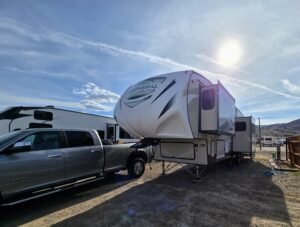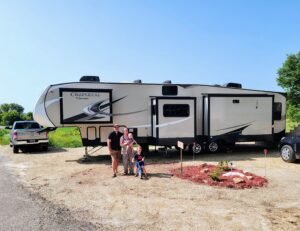Last updated on September 1st, 2024 at 02:29 am

Are you considering jumping into full time RV life? This article will cover everything you should consider before purchasing your first RV, and what makes the best RV for full time living.
The idea of living full time in an RV has gained immense popularity in recent years, and it’s no surprise why. The freedom to explore new places, the simplicity of a minimalist lifestyle, and the joy of spending quality time with family make this an appealing choice for many.
Table of Contents
As a wife and mom of two who has embraced this lifestyle, I can tell you that choosing the right RV is crucial to making this dream a reality. In this article, I’ll share what makes the best RV for full time living, focusing on features rather than specific brands, to help you find the perfect home on wheels.
This page contains affiliate links. As an Amazon Associate, I earn from qualifying purchases. If you choose to purchase after clicking a link, I may receive a commission at no extra cost to you. I only endorse things that I have personally used or come highly recommended by trusted peers.
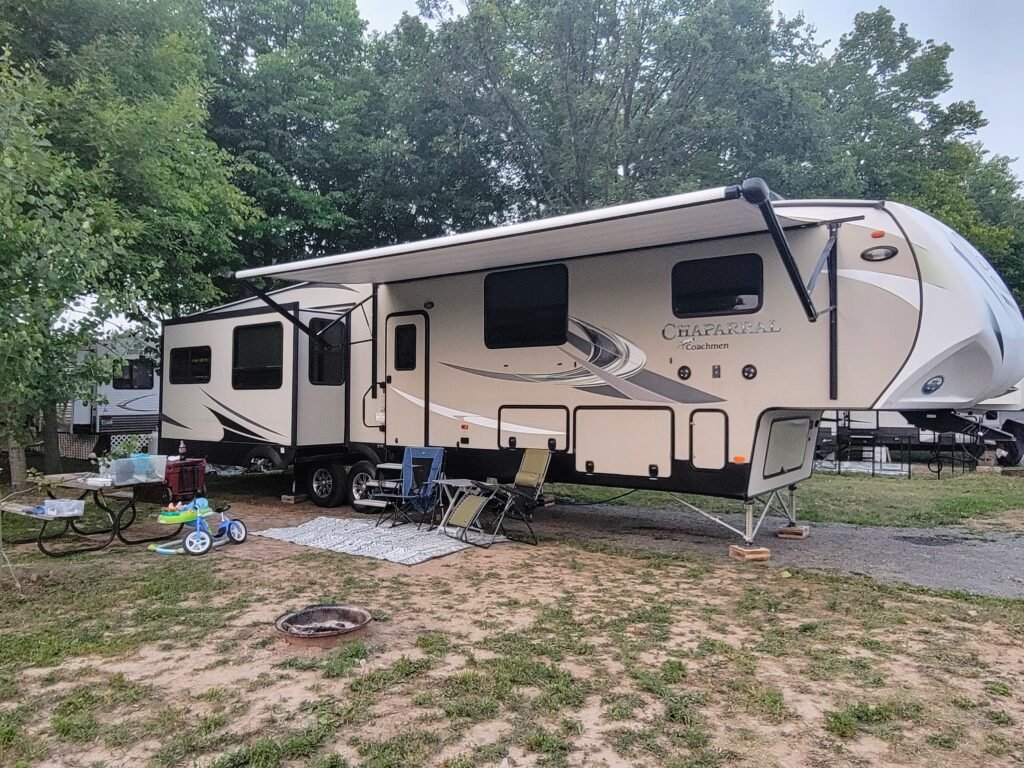
What to Consider When Choosing the Best RV for Full Time Living
Understanding Different RV Classes
When it comes to RVs, there are several classes to choose from, each with its own set of advantages and disadvantages.
Motorhomes
A motorhome is an RV that has its own engine and is driven, not towed. Class A motorhomes are the largest and often the most luxurious, providing ample space and amenities that make them ideal for families. Class B motorhomes, also known as camper vans, are more compact and easier to maneuver, but they might feel cramped for a family. Class C motorhomes are a great middle ground, offering a good balance of space and drivability.
Campers
Alternatively, a travel trailer/camper is towed with a vehicle. There are two types of campers, one pulled behind the vehicle and one that requires a special hitch called a fifth wheel. The pull behind campers are often relatively smaller and this type of hitch does not offer as good towing control as a fifth wheel does. However, they are usually more affordable. A fifth wheel requires a pickup truck equipped with a fifth wheel hitch, which can be expensive to have installed. These offer a more seamless towing experience and allow a very large camper to be towed.
Our family has a fifth wheel camper and it works perfect for us.
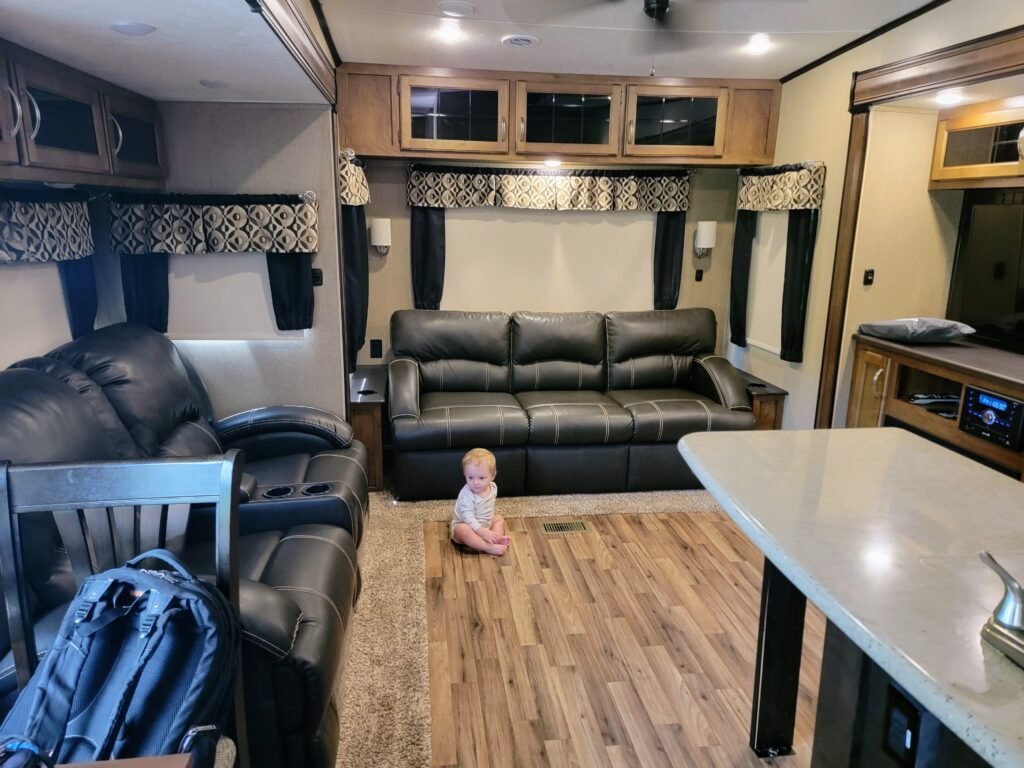
Assessing Your Family's Space Needs
One of the first things to consider is how much space your family needs. For a family of four, having enough living space and storage is essential. Think about the amount of time you’ll spend inside the RV, especially during bad weather, and make sure there’s enough room for everyone to be comfortable.
Families with young children may need more space for toys and play areas, while families with teenagers might prioritize privacy and separate sleeping areas. We find it important to allow every child to have their own private space. Ideally, this would mean their own private room, but if that isn’t feasible make sure there is a nook that they can have all to themselves.
Ours is 42 feet long, which does prevent us from staying at some campgrounds due to size restrictions. However, this size is necessary for our family to live comfortably and it’s worth the sacrifice. We haven’t run into this issue often.
Let me plan your next trip!
Reasons to book with me-
- You’ll have a better planning & booking experience (with personalization, insider intel & attention to detail) before your trip
- You will travel like a VIP with no additional cost to you. No, really! Hotels pay my commission and favor clients who work with travel advisors. They give me perks to pass on to you like room upgrades, hotel credits, etc.
- You can feel good about supporting a small-business entrepeneur. You get to collaborate with a real person- no call centers or algorithims here.

Family-Friendly Floor Plan Options
When it comes to floor plans, the best RV for full time living will have a layout that works for your family’s lifestyle. Look for options that provide separate sleeping areas for parents and kids, such as bunk beds or loft spaces. Having a dedicated dining area that can double as a workspace for homeschooling or remote work is also a great feature. Additionally, ample storage space for clothing, toys, and other essentials is a must.
This next one isn’t necessarily essential, but highly recommended. If you are able to purchase an RV with a second bathroom, DO IT. Trust me.
New Vs. Used RVs
This is the classic debate. Personally, I recommend going with a used RV. RVs, like many things, depreciate quickly once they leave the lot. It’s also common theory in the RV community that all new RVs go through a streak of faulty factory-grade things breaking early on. So, in theory, if you purchase a used RV the owner will have already experienced and paid for these fixes.
If you do decide to purchase a used RV, you have the option of paying for a formal inspection from an inspection company. This way you have a better idea if there’s any issues with the RV. These are costly, however, and can’t guarantee you won’t have any issues.
This brings me to my next point- you are going to have issues with your RV regardless of which route you choose. RVs break. Often. Please know this going into it. You will be paying for fixes for the life of the RV. If you accept this early on, it makes it easier when it inevitably happens.

As of 2024, I am a certified Hawai’i Destination Specialist through the Hawai’i Visitor and Convention Bureau.
This certification ensures a deep understanding of Hawaii’s diverse landscapes, culture, and attractions, providing insider insights and access to exclusive recommendations and hidden gems. With tailored itineraries customized to your preferences and VIP treatment for preferred bookings, trust in Elevated Travel to create an unforgettable Hawaiian getaway.
Essential Features for the Best RV for Full Time Living
Kitchen and Cooking Facilities
As a full-time RV family, you’ll be preparing and eating most of your meals on the road, so a well-equipped kitchen is a top priority. Look for an RV with a full kitchen, including a stove, oven, microwave, and a decent-sized refrigerator. Storage solutions like pantry space and ample cabinets are crucial for keeping your kitchen organized and functional. A large sink and counter space for meal prep can make a big difference in your day-to-day living.
Some RVs offer residential-sized appliances, and this may be a good option for you depending on how much time your family spends preparing meals.
Bathroom Amenities
Bathroom amenities are another important consideration. It is rare, but some RVs come with bathtubs, and this may be ideal for young children. We started full-time RV living when our youngest was 7 months old, and bathing in the kitchen sink worked just fine for us.
Another consideration is the type of water heater. If the RV comes with a standard electric water heater, that may not be enough for a family living full-time. We invested in having a tankless water heater installed. This upgrade is pricy, but it runs on propane rather than electric and gives you unlimited hot water, whereas most electric water heaters only have a 6 to 10 gallon capacity. This means a cold shower after just a few minutes.
Living and Dining Areas
The living and dining areas should be versatile and comfortable. Look for RVs with flexible furniture options that can be rearranged to suit different activities, such as family dinners, game nights, or movie watching. A dining area that can also serve as a workspace is especially useful for homeschooling or remote work. Entertainment systems, like a TV and sound system, can help make your RV feel more like home. We have a couch that pulls out into a bed and the kids love this feature for “sleepovers” in the living room.
Practical Considerations for Full Time RV Living
Heating and Cooling Systems
Living in an RV full time means you’ll experience a variety of climates, so efficient heating and cooling systems are essential. Many RVs come equipped with propane heaters and electric air conditioners, but you might also consider adding portable units or fans for extra comfort. Take my word for it, the standard ACs that RVs come with often cannot keep up with intense summer heat, so be prepared to invest more money in additional cooling systems.
Insulation and Weatherproofing
Proper insulation is key to maintaining a comfortable temperature inside your RV year-round. Look for an RV with high-quality insulation. These RVs are usually labeled with something along the lines of “all season” or “four season.” Avoid RVs that are labeled “lite,” as they will have less insulation to decrease the overall weight of the camper.
Consider adding additional weatherproofing measures, such as insulated window covers or skirting for the winter months. These upgrades can help keep your RV warm in the winter and cool in the summer, reducing energy costs and improving overall comfort.
Power Supply Options
When living in an RV full time, having reliable power is crucial. Solar panels are a popular choice for generating electricity off-grid, and many RVs are now equipped with built-in solar systems. A generator can provide backup power, while shore power connections allow you to plug into external power sources at campgrounds. Make sure your RV’s electrical system is up to the task of powering all your devices and appliances.
Water and Waste Management
Managing water and waste efficiently is a critical aspect of RV living. Look for an RV with large freshwater, greywater, and blackwater tanks to reduce the frequency of refills and dumps if you’re “boondocking,” or not hooked up to water and sewer resources. A high-quality water filtration system can ensure you have clean drinking water wherever you are.
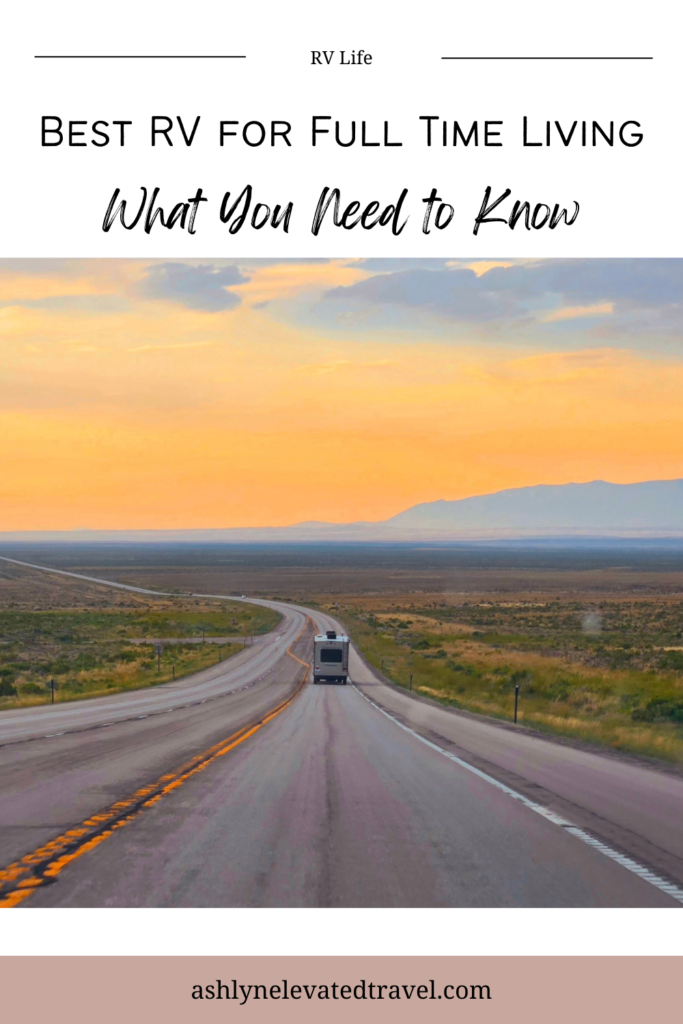
Like this article? Pin it for later!
Maintenance and Repairs
Regular Maintenance Tasks
Keeping your RV in good condition requires regular maintenance. This includes tasks like checking the roof for leaks, maintaining the tires, and servicing the engine if you have a motorhome. Regularly inspecting and cleaning the RV’s exterior and interior can prevent bigger problems down the road. If you buy a used RV, MAKE SURE IT COMES WITH THE FACTORY MANUAL! This will be a lifesaver.
DIY Repairs and Resources
Being able to handle basic repairs yourself can save you time and money. Common issues like leaky faucets, blown fuses, or minor electrical problems can often be fixed with a little know-how and the right tools. There are plenty of resources available, from online tutorials to RV maintenance books, to help you become more self-sufficient on the road.
Safety and Security
On the Road Safety Features
Safety is paramount when living in an RV full time. Ensure your RV is equipped with essential safety features like smoke and carbon monoxide detectors, fire extinguishers, and a first aid kit. Regularly check tire pressure and condition, and make sure your RV’s brakes and lights are functioning properly. Having a roadside assistance plan can provide peace of mind in case of breakdowns.
Security Measures
Protecting your RV from theft and break-ins is also important. Invest in good quality locks for all doors and windows, and consider adding a security system with cameras and motion detectors. I highly recommend installing an enhanced lock on the door. This is the one we use and is highly recommended within the RV community. Standard RV locks are easy to break into, and this comes with a keypad so you don’t have to carry a key with you.
Parking in well-lit, secure areas and getting to know your neighbors at campgrounds can also enhance your safety.
Conclusion
Choosing the best RV for full time living is a significant decision that can greatly impact your family’s comfort and happiness on the road. By considering factors like size and layout, essential features, and practical considerations, you can find an RV that meets your family’s needs and makes full-time RV living a joy.
The most important thing I want you to take away from this article is that full time RV living is an investment. Be prepared for frequent repairs, filling propane tanks, buying additional comfort features, etc. If you are prepared with some extra money set aside you are so much more likely to enjoy this nomad lifestyle.
As a mom of two who loves this lifestyle, I encourage you to research and test different RVs, involve your family in the decision-making process, and embrace the adventure that awaits. Full time RV living has been an incredible decision for us, and we couldn’t be happier!
If you’ve found this guide helpful, please share your family’s RV living experiences and tips in the comments below. Questions? I’d be happy to answer them!
For more information and resources, check out my other articles on full-time RV living and family travel. Happy travels!

